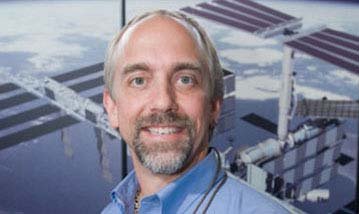Garriott and Carmack launch rocket talk
QuakeCon 2010: Game development legends and space travel enthusiasts plot parallel paths into rocketry and space exploration.
Who was there: Ultima creator Richard "Lord British" Garriott and id Software chief technical officer John Carmack were on hand to talk about their endeavors. Garriott made headlines two years ago with his trip into space, while Carmack's own company Armadillo Aerospace is working on rocket technology with the goal of making travel to space less expensive.

What they said: Ordinarily a slide show full of some guy's vacation photos wouldn't be featured or appreciated at QuakeCon. But when that guy is Garriott and the vacation was a trip to the International Space Station, people are more likely to pay attention.
Garriott started the marathon two-and-a-half-hour-long session by explaining his interest in space travel and why the parallel paths of he and Carmack aren't terribly surprising. Gamers are inherently into exploration and technology, Garriott noted, so the progression from one pursuit to the next is perfectly natural.
It might be more even natural for Garriott, as his father was an astronaut who made two trips into space. As if that wasn't enough exposure to the idea of space travel, Garriott's neighbors growing up were also astronauts.
"I grew up believing that everybody would go into space because everybody I knew did go into space," Garriott joked.
That's an idea Garriott wants to see realized. Even as a teenager, he wanted to create a civilian space agency. And while Garriott has invested in plenty of failed outfits that shared his goal, he said operations like the X-Prize, Zero G, and Space Adventures are pushing his vision closer to reality.
Now that Garriott has been to space and back, his belief that everyone should go is even stronger. He called it a "profoundly life-changing event," one that hammered home exactly how finite the earth and its atmosphere really are. Despite the bigger picture view, Garriott said travelling around the earth at 17,000 miles per hour was a surprisingly intimate experience.
Passing over San Francisco, he could see the Golden Gate Bridge and Alcatraz, and even spotted a ship by its wake. At the same time, he saw that every fertile part of the earth that could be used by people was being used by people, whether for cities or farms. There are no vast, green spaces left on the planet, something that Garriott said has made him far more environmentally conscious than he had been before.
Garriott wants that epiphany to be shared by more people, and that means making space travel considerably more cost effective. He pointed to Armadillo Aerospace as leading that charge with a novel approach to the problem. On occasion, Armadillo creates its own customized special parts like a reusable rocket nozzle to keep costs down, but most of its rockets are made from pieces that can be bought on the Internet with a total build cost less than $250,000.
Taking over the session, Carmack explained the mindset behind the exorbitant price tags on NASA projects. He pointed back to the dawn of rocketry and the space race, when countries would throw money at ideas like manned space flight or intercontinental ballistic missiles capable of carrying a nuclear payload, reasoning that nothing else mattered beyond those goals.
"When failure is not an option, success is going to be really expensive," Carmack said. He added that so long as the customers involved in the field--mostly governments--are willing to spend huge amounts on space travel, there's no incentive for people to cut costs.
Another stumbling block for affordable space flight is that space travel has been inappropriately mythologized, Carmack said. He took particular exception with the saying that something simple "isn't rocket science."
"Rocketry is actually pretty damn simple," Carmack said. "It's just the consequences of failure are very high."
As a result, Armadillo planned on failure from the outset. Carmack said iteration is the key to almost all progress, so the company started small and cheap eight years ago, expecting that not everything would go off without a hitch. As a result, Armadillo has built 20 different airframes, learning a little more with every try. In the last couple years, the company has even contracted work for NASA and the Rocket Racing League, even managing to turn a profit.
Still, profit isn't the point of the venture. While it's nice to have created something of value, Carmack said he's wary of having the team working on projects that are only tangentially related to his goals just to keep the lights on. Carmack said he has spent $4 million out of pocket on Armadillo in the last eight years, and he's going to be ramping that up in hopes of making progress faster.
Takeaway: Many of the same traits that made Garriott and Carmack successful game developers--determination, curiosity, ambition, vision, love of solving puzzles, and passion for their work--are the same forces that have driven the pair's interest in space travel. Garriott may have been the first developer in space, but if the pair has its way, he'll be far from the last.
Quote: "I hate that word. I don't think of myself as a tourist at all. I was looking at this as a business, not a joyride. Although it was a pretty joyful ride."--Garriott, on media accounts labeling him a space tourist.
Got a news tip or want to contact us directly? Email news@gamespot.com
Join the conversation